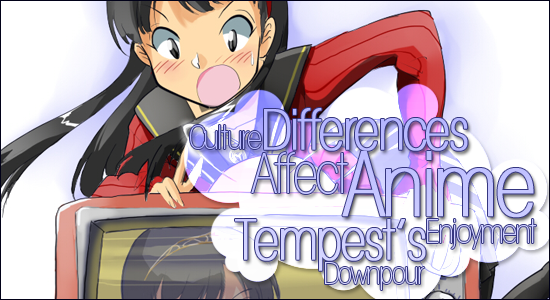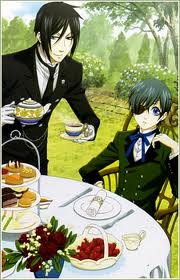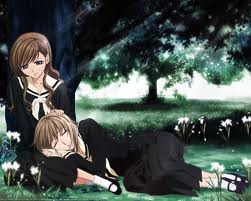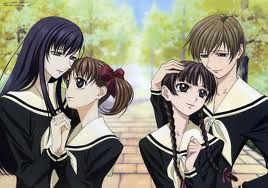Tempest’s Downpour – Culture Differences Affect Anime Enjoyment

Black Butler and Maria Watches Over Us are two series that have been vehemently recommended to me. They’re everything I should enjoy in programming: the first is about a butler who is secretly a demon, while the second is about schoolgirl lesbians. I mean, what more could I possibly ask for?
The problem is that I hate both shows.
Rule number 2 of being an anime fan: never judge a series by its first episode. Yes, that idea (presented well by Uncle Yoh) has been hammered into me throughout my lifetime as an otaku. Nonetheless, I haven’t been able to sit through a single episode of either series.
It has been brought to my attention that my issues are related to cultural differences. And this isn’t something a lesson in Anime In-Jokes will cure – these shows fight something so ingrained in Western Culture that I can’t help balking.
In Black Butler, the titular character, Sebastian, is one hell of a butler, meaning that he’s ludicrously good at his job. The other three important staff members (a gardener, a chef and a maid respectively) admire him for pulling the most weight, so to speak. They decide to impress him by being super spectacular at their jobs for a day.

“One hell of a butler,” figuratively and literally, in case you didn’t get the joke.
Needless to say, all three find ways of messing up their respective tasks. Finally, Sebastian swoops in and cleans up all their messes. They love and admire him like they’re his freaking cheerleaders.
By Western standards, this is utterly ridiculous. But Japanese culture emphasizes the group: the group works towards the better good and whoever is pulling the most weight is admired because he/she improves everyone’s standing. In Japanese classrooms, when the teacher poses a question, the entire class is supposed to answer in unison. Therefore, the smartest person in class would reflect positively on the classroom as a whole.

This level of “admiration” is called “wanting to get in his pants.”
Meanwhile, Western society emphasizes the individual: each person is looked to for his/her abilities. If there is a person who is the best at something, others must work to try to gain the advantage. The strongest and smartest are looked upon as rivals. In Western classrooms, the teacher poses a question and waits for people to raise their hands. Then the teacher calls on a student and that student’s answer reflects on his or her individual grade. The smartest person in a class is often looked upon with either scorn or jealousy.
Both systems have their own strengths and weaknesses. If the focus is on the group, individual endeavors go unnoticed. And if a person is not particularly strong or is weak in a subject, he or she reflects negatively on the group. Meanwhile, if the focus is on the individual, the groups often have a lot of tension and sometimes lose track of the ultimate goals.
Having the other characters to hero-worship Sebastian so strongly is a very typical (if a bit satirical) take on Japanese culture. My Western breeding just can’t handle it.
Then there’s Maria Watches Over Us. This is a yuri (shojo-ai) series that takes place in an all-girls Catholic school where the upperclassmen mentor underclassmen to an almost Spartan extent, if you know what I mean.

That looks like an interesting way to “mentor.”
They teach these freshmen proper etiquette and dance and… I don’t know, other things girls in Catholic schools do. Oftentimes these relationships turn romantic.
The problem is that the nuns are in on it. These teachers know exactly what’s going on, and they’re FINE with it. They gossip about these young women and even push for these relationships to form.

A wild yuri anime approaches!
But “gay” in Japan isn’t seen as quite the same thing as it is in the West. In Japan, it’s pretty much assumed that young girls have close bonds with one another and will seek to explore things with their closest female friends. That includes romantic interests and activities. It’s all seen as preparation for when the girl eventually marries a man.
Of course, some girls don’t “grow out” of this phase. A friend of mine kept recommending Maria Watches Over Us by insisting that one of the girls is rather keen on being a lesbian. This friend compared her to a “dirty old man,” and though I find that hilarious, the gossip amongst the nuns and the whiny violin music were enough to send me running away from this series.
I would like to work up the nerve to look past cultural differences and enjoy these shows for what they really are. Maybe if I pretend the secondary cast of Black Butler is auditioning to be the next Dallas Cowboys cheerleaders, and maybe if I watch Maria Watches Over Us on mute, I can find a way to enjoy both shows.
















I still abide by the “I must watch past episode one”, and I also don’t drop anything. I’ve only dropped five shows, but generally after I get about thirteen or so episodes in (of say a twenty-six episode series).
I’ve been reading some of the Black Butler manga, and honestly, I think I’d like the anime that people hate so much. The manga feels entirely of filler with different chapters just making characters that are bland continue to do things that should be neat. I feel like it has no character growth what so ever, but I have this hope that perhaps there’s more life to the anime.
I can’t really comment on the second anime, I’ve heard it’s amazing, but I can’t really say for myself.
I understood your critique of Black Butler(though i haven’t and don’t plan on watching it), and despite also being bored to tears after a couple episodes of Maria forced on me when I was in an anime club, I don’t really get where you’re coming from? Like I’m not understanding what the critique is.
I don’t know about Maria Watches Over Us, but Black Butler is an awesome series. I think that the chef, maid, and gardener may be there for comedy relief, but they can also represent a deeper meaning as well. I’ve been reading the manga, and I like it only for the action and the beautifully detailed artwork. Sebastian is the coolest butler I’ve ever seen. I thought that was the reason why people like Kuroshitsuji. That, and some people find him to be pretty hot.